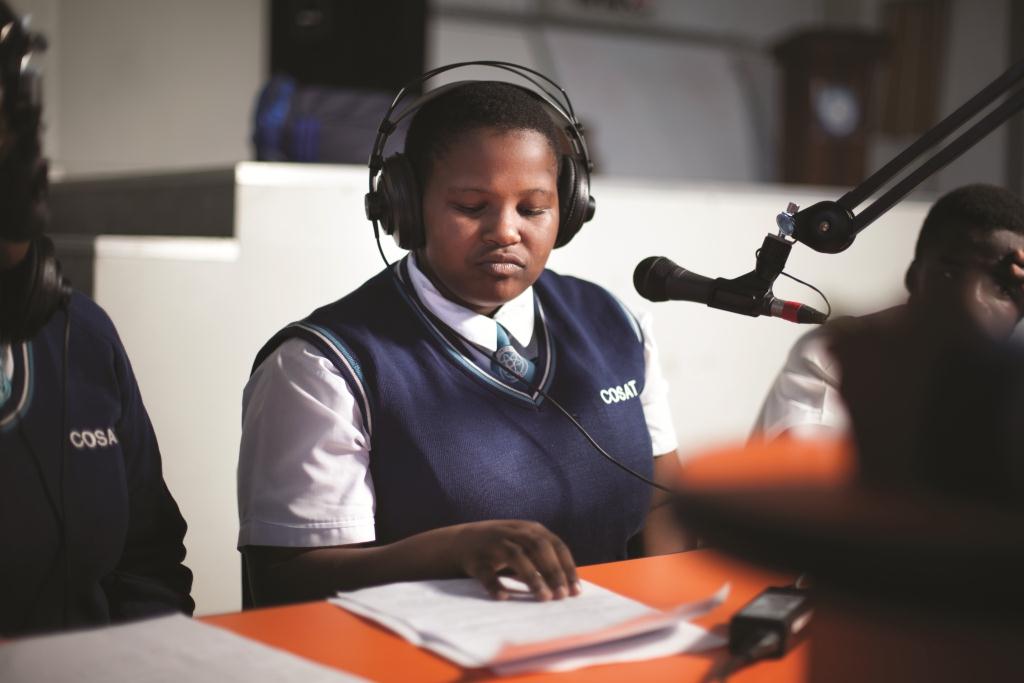Peer pressure has been the cause of many young – and not so young – people going sadly astray. For Elethu Rotsho, a 15-year old, Grade 10 student at the Centre of Science and Technology (COSAT), a secondary school in Khayelitsha, Cape Town, peer pressure has led him down a much more positive path. He is one of 12 students who are collectively known as the Optimistic Youth Reporters, which he joined “because my friends forced me to join”.
In October last year, the Optimistic Youth Reporters had the first broadcast of what is the first public high school radio station on the African continent. The COSAT radio project was established by the Children’s Radio Foundation (CRF), which is involved in projects across six African countries (Liberia, Cote d’Ivoire, the Democratic Republic of Congo, Tanzania, Zambia and South Africa) designed to provide platforms for young people to express themselves using radio.

The relationship with COSAT was, as explained by Project Manager, Linda Daniels, “initiated by a journalist who spent some time doing a story on the school for international media. He had been working with a group of Grade 7 kids and felt that, considering our work with young people, it was a good fit.”
Despite joining because of his friends, for Rotsho, “as time has passed, I really got into it. I really want to contribute to getting teenage voices around the country heard. While I grew up in a comfortable home in Khayelitsha, the environment in the township has a lot of negative influences, like smoking and crime. I don’t think that mainstream media are doing enough in talking about the issues that affect us a young people.”
Loading...
Ongeziwe Mgidi, also a 15-year old Grade 10 student, agrees.
“Most of the media focuses on older people while it is us young people who are facing the biggest challenges. If they could put more attention on the young, including highlighting young people reaching higher levels of society at a younger age, it would help,” she says.
Mgidi signed up because she has always been interested in a career in journalism. While she initially thought becoming an Optimistic Young Reporter would involve writing articles, it has given her insight into a different aspect of journalism as well as running a radio show.
“We broadcast once every two weeks to a live audience but meet every Friday for training and to prepare for each show. We divide ourselves into the different positions, i.e. producer, researcher, presenter, etc. for that specific show. My favorite role is producer. I’m good at keeping time and I like people to do what I say,” says Mgidi.
“We look at the challenges that we, as youth, the township and the whole country, face and put together the show topics from that. We go out and interview our school mates and people from the community, which we include in the show. The presenters then discuss it on air before opening up for comments from the audience,” says Rotsho.
The show is broadcast from a radio desk that has been built in a hall at the school. CRF’s role has been to facilitate the weekly sessions, which started over two years ago, providing the young reporters with a solid foundation in radio reporting skills, media ethics and child rights. They will be leaving the school and the young reporters to maintain and run their station independently in the next few months.
“This has been very much a two-way process; a horizontal exchange between myself, other CRF colleagues and the young people. What’s exciting is we can see a lot of the topics push beyond the school gates into community. We have had parents and teachers engaging. It’s been an incredible learning experience. I’ve been struck by the vibrancy and energy of these young people, who we can learn from. As adults, we tend to think we know better in terms of guiding and teaching. They have much to teach the world,” says Daniels.
And the young reporters have gained immensely from being part of the project, both in terms of their own personal development as well as in contributing to the solving of some of the issues they face.
Mgidi says she has become much more confident and comfortable with asking questions and sharing her opinions, although a journalism career no longer seems to be in her future.
“I talked to my parents about journalism but they feel it isn’t a stable career. The more you are published, the more you get paid but it isn’t guaranteed. I’m now thinking of forensics because I like finding out things.”
For Rotsho, who raps and is passionate about music, the future is not as clear. At this stage, his focus is on doing what he can as part of the Optimistic Young Reporters.
“It is important to communicate directly with the residents of the township. We need to try find solutions from them because (we) are the ones living with the challenges. Radio helps with this and we normally get positive feedback. It has also taught me how to think better as well as differentiate between positive and negative things,” he says.
What COSAT’s radio project demonstrates is that the future of Africa are truly engaged in their lives and the world around them. They are playing their part to ensure that the past and present create a very different future.
Loading...
